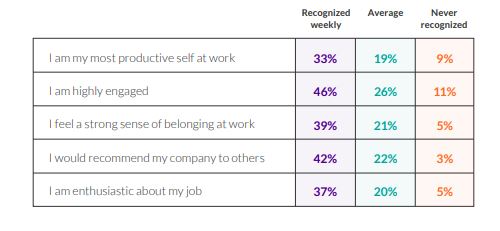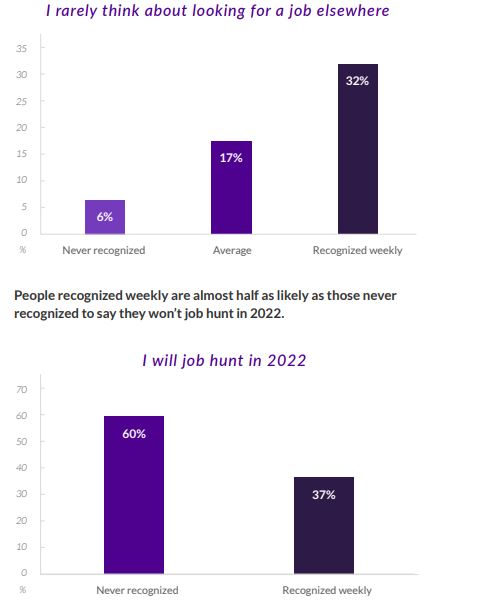It’s time to recognize your workers
Especially if you want to thrive in the ‘Great Resignation’.
Why You Should Care
Employers are trying to figure how to win the war for talent.
Could the answer be as simple as better employee recognition?
Achievers thinks so! Check out the facts and figures.
As the ‘Great Resignation’ rages on, employers are grappling with how to attract and retain talent in this highly competitive war for talent. Is higher pay the answer? Could better benefits help? How important is flexible working to create a work-life balance?
According to reward marketplace Achievers and its 2022 State of Recognition report, the answer is appreciating and recognizing workers better.
Achievers surveyed 4,200 employees in Australia, Canada, the US, and the UK – 65% said being recognized would reduce the desire to job hunt and 57% said recognition would decrease their likelihood to take a call from a head-hunter.
The report found that recognition had a positive impact on employee engagement, productivity, and advocacy – in fact, 66% said recognition had a bigger impact than a good salary. In addition, 52% said recognition would reduce the impact of a salary freeze.

Creating a culture of recognition
As Achievers’ writes in its report, “not all recognition is created equal”. The recognition that employees are seeking to stay in their jobs is meaningful, genuine appreciation.
The study notes that a simple thank you is not enough, and “recognition for recognition’s sake is not the goal”. 64% told Achievers that they preferred meaningful to regular recognition.
Instead, employers need to ensure the appreciation is specific to something the workers did, or it is about them as individuals or something they value.
While quality recognition is crucial, Achievers’ report found that quantity is also essential; “having employees only recognized a few times a year simply won’t move the needle on engagement and retention, and neither will superficial recognitions.”
The survey found that those who were recognized weekly are almost 50% less likely to job-hunt and five times more likely to have a strong commitment to their jobs.

Quality and quantity recognition starts to create a culture of recognition in an organization – but another thing that helps here is managers leading the way. Achievers’ report found that those recognized by their managers were more likely to then appreciate their colleagues.
Natalie Baumgartner, chief workforce scientist at Achievers, commented: “An optimized program is critical to building a culture of recognition that starts at the top with people leaders and is supported and reinforced at every level.
“Recognition is a powerhouse engagement tool on many levels, and a strong culture of recognition can help retain talent by competing beyond salary and standard benefits and perks.”
Investing in the right tools is also important as this ensures that the culture of recognition exists across an organization not just in certain teams.
This tech must be optimized and integrate with tools that employees use every day like Microsoft Teams, Outlook, or Slack. 55% of respondents told Achievers this was important; they don’t want to log on to a new platform every time they want to recognize their colleagues.
The only question that remains is: are you ready to embrace recognition and turn the ‘Great Resignation’ into the ‘Great Recognition’?
Sign up to the UNLEASH Newsletter
Get the Editor’s picks of the week delivered straight to your inbox!

Chief Reporter, UNLEASH
Allie is an award-winning business journalist and can be reached at alexandra@unleash.ai.
Contact Us
"*" indicates required fields
Partner with UNLEASH
"*" indicates required fields